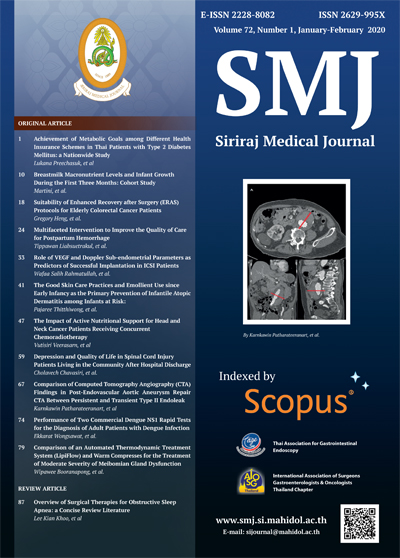Performance of Two Commercial Dengue NS1 Rapid Tests for the Diagnosis of Adult Patients with Dengue Infection
DOI:
https://doi.org/10.33192/Smj.2020.10Keywords:
Dengue infection; nonstructural protein -1; adult patients; rapid detection testAbstract
Objective: To determine the diagnostic performance of two commercially available dengue NS1 antigen rapid detection tests (RDTs); namely the SD BIOLINE Dengue NS1 RDT and the ImmuneMed Dengue NS1 Rapid, for the diagnosis of adult patients with dengue infection.
Methods: The study was performed by using archived samples from 237 patients with the laboratory-confirmed dengue infection. Archived, well-characterized samples from an additional 208 febrile individuals from Thailand were used as the control group. Reference testing to confirm the diagnosis in dengue patients included RT-PCR and in-house NS1 ELISA, in-house IgM and IgG capture ELISAs.
Results: The sensitivity of the SD BIOLINE Dengue NS1 RDT was 100%, and the specificity was 99% (95%CI 96.6 to 99.7%). False positive was found in 2 samples from patient with scrub typhus. The sensitivity and specificity of the ImmuneMed Dengue NS1 Ag Rapid were 97.4% (95% CI, 95.5 to 99.5%) and 96.6% (95%CI 93.5 to 98.4%) respectively. False positive results were found in 7 patients with murine typhus, scrub typhus, and influenza.
Conclusion: Both RDTs showed comparable sensitivity and specificity in this study population. Data from this study could be used to facilitate data-driven laboratory test choices for managing patient care during dengue outbreaks.
References
2. World Health Organization. Dengue guidelines for diagnosis, treatment, prevention and control: New Edition. WHO/HTM/NTD/DEN/2009.1 (World Health Organization, 2009).
3. Centers for Disease Control and Prevention. 2012. Laboratory guidance and diagnostic testing. Centers for Disease Control and Prevention, Atlanta, GA: http://www.cdc.gov/ dengue/clinicalLab/laboratory.html.
4. Andries AC, Duong V, Ngan C, Ong S, Huy R, Sroin KK, et al. Field evaluation and impact on clinical management of a rapid diagnostic kit that detects dengue NS1, IgM and IgG. PLoS Negl Trop Dis 2012;6:e1993.
5. Lee H, Ryu J H, Park H-S, Park K H, Bae H, Yun S, et al. Comparison of six commercial diagnostic tests for the detection of dengue virus non-structural-1 antigen and IgM/IgG antibodies. Ann Lab Med 2019;39:566-71.
6. Yenchitsomanus PT, Sricharoen P, Jaruthasana I, Pattanakitsakul SN, Nitayaphan S, Mongkolsapaya J, et al. Rapid detection and identification of dengue viruses by polymerase chain reaction (PCR). Southeast Asian J Trop Med Pub Health 1996;27:228- 36.
7. Puttikhunt C, Prommool T, U-thainual N, Ong-ajchaowlerd P, Yoosook K, Tawilert C, et al. The development of a novel serotyping-NS1-ELISA to identify serotypes of dengue virus. J Clin Virol 2011;50:314-9.
8. Innis BL, Nisalak A, Nimmannitya S, Kusalerdchariya S, Chongswasdi V, Suntayakorn S, et al. An enzyme-linked immunosorbent assay to characterize dengue infections where dengue and Japanese encephalitis co-circulate. Am J Trop Med Hyg 1989;40:418- 27.
9. Shu PY, Chang SF, Kuo YC, Yueh YY, Chien LJ, Sue CL, et al. Development of group- and serotype-specific one-step SYBR green I-based real-time reverse transcription-PCR assay for dengue virus. J Clin Microbiol 2003;41:2408-16.
10. Suttinont C, Losuwanaluk K, Niwatayakul K, Hoontrakul S, Intaranongpai W, Silpasakorn S, et al. Causes of acute undifferentiated febrile illness in rural Thailand: a prospective observational study. Ann Trop Med Hyg 2006;100:363-70.
11. Suputtamongkol Y, Niwattayakul K, Suttinont C, Losuwanaluk K, Limpaiboon R, Chierakul W, et al. An open, randomized, controlled trial of penicillin, doxycycline, and cefotaxime for patients with severe leptospirosis. Clin Infect Dis 2004;39:1417- 24.
12. Thipmontree W, Suputtamongkol Y, Tantibhedhyangkul W, Suttinont C, Wongsawat E, Silpasakorn S. Human leptospirosis trends: northeast Thailand, 2001-2012. Int J Environ Res Public Health 2014;11:8542-51.
13. Teparrukkul P, Hantrakun V, Day NPJ, West TE. Management and outcomes of severe dengue patients presenting with sepsis in a tropical country. PloS One 2017;12:e0176233.
14. Tricou V, Vu HT, Quynh NV, Nguyen CV, Tran HT, Farrar J, et al. Comparison of two dengue NS1 rapid tests for sensitivity, specificity and relationship to viraemia and antibody responses. BMC Infect Dis 2010;10:142.
15. Hsieh CJ, Chen MJ. The commercial dengue NS1 antigen-capture ELISA may be superior to IgM detection, virus isolation and RT-PCR for rapid laboratory diagnosis of acute dengue infection based on a single serum sample. J Clin Virol 2009;44:102.
16. Pal S, Dauner AL, Mitra I, Forshey BM, Garcia P, Morrison AC, et al. Evaluation of dengue NS1 antigen rapid tests and ELISA kits using clinical samples. PLoS One 2014;9:e113411.
Downloads
Published
How to Cite
Issue
Section
License
Authors who publish with this journal agree to the following conditions:
Copyright Transfer
In submitting a manuscript, the authors acknowledge that the work will become the copyrighted property of Siriraj Medical Journal upon publication.
License
Articles are licensed under a Creative Commons Attribution-NonCommercial-NoDerivatives 4.0 International License (CC BY-NC-ND 4.0). This license allows for the sharing of the work for non-commercial purposes with proper attribution to the authors and the journal. However, it does not permit modifications or the creation of derivative works.
Sharing and Access
Authors are encouraged to share their article on their personal or institutional websites and through other non-commercial platforms. Doing so can increase readership and citations.















